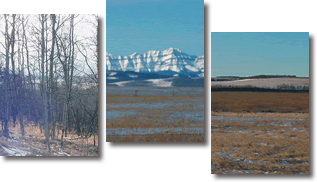

Barb Martin, Mentor teacher from Galileo Educational Network
Meaningful work, discovery and understanding take time and purposeful
collaborative planning. Creating activities, mini lessons, worksheets,
and evaluation for projects that are for a short period of time are where
teachers traditionally begin their planning process. This process is often
done in isolation without having the opportunity to work collaboratively
with teaching partners.
"Working in this way requires time, and understanding of the
topic, an understanding of the curriculum and an understanding of how
kids learn. If you do not have the time spent in each of these areas
it is difficult to create an inquiry-based project like this one."
This project took the teachers in a different direction with their professional
development as they began to understand that when you take time to plan
work that is meaningful it begins to foster a sense of discovery and understanding
that becomes very powerful. This direction had many questions, hard work
and uncertainties. As a mentor teacher throughout the planning, I continually
guided the teachers to reflect upon the following:
- Why are we studying the Native People?
- What matters?
- How do we measure and recognize understanding?
- How do we create a project where the students take ownership for their
own learning.
We wanted to create a project where the learning came from the students
and teachers own discoveries as well as learning through the discovery
of others.
Where do you start to work in a different way? We started from the realization
that we wanted to do something different - beyond "delivery and coverage"
of the curriculum. This was not to say that what we had done before was
not okay, it certainly was, but we were ready for a new direction with
our own teaching practice. When working with students it is important
to:
- deeply understand the subject or topic that you are about to study,
- know the possibilities within the curriculum, and
- know how children learn.
I started with reflective discussions of what the teachers wanted to
learn and upon what discoveries they wanted to embark. This was an uncomfortable
process for the teachers because, although they knew that working in this
way was powerful, the journey was not familiar. There were no text books
to guide us. We had to become learners and discovers. Reflective conversation
was a very important component of this journey as we continually needed
to clarify our learning by sharing what we had discovered. Our guiding
questions were:
- What is important in our project?
- When we completed our project what would the students continue to
wonder about?
- How will the kids be different and what difference will this project
make in their lives?
"The students did not want to let the project come to an end
and neither did the teachers. There were always questions to answer
and discoveries to make."
Throughout the process the teacher's emotions ranged from excited, scared,
confused, energized and exhausted. The teachers often mentioned that this
was unfamiliar to them and they had to constantly force themselves to
stop reverting to traditional planning where they focused on activities
and lesson planning. They both agreed that, as valuable the project was,
without the mentoring process they would have reverted to the traditional
planning where they were comfortable.
"This is very hard work and could not have been done without
the help of the Galileo mentor. We would never have opened up the project
to this point if it was not for the mentorship."
Because this project was dealing with issues that were so complex and
in-depth we couldn't find resources that fit comfortably into a package.
Too often we rely on materials that we have readily available and stay
within the limits of this source. We were insistent that we did not want
generalizations or a watered-down view of the people we were studying.
The teachers were highly motivated to find sources for our own learning.
"There were places in the project where we were unsure and
it was an uncomfortable feeling but by persisting and getting to this
point, it was well worth all of the time that we spent."
We immersed ourselves in reading to understand and come to an appreciation
of the Native People. Through our learning we discovered what mattered
and what had to uncovered by the students as well as us. The teachers
arrived at the statement of "People live in different ways for very
important reasons". This is the guiding statement that directed our
future work.
"The student's have a very strong understanding of the native
people. Their thoughts show understanding in a way that I would not
have imagined."
"I can't believe the depth of the student's understandings.
We could never have reached this point with our traditional methods
of teaching. You have to make time for discovery and through reflective
discussion comes understanding."
|

